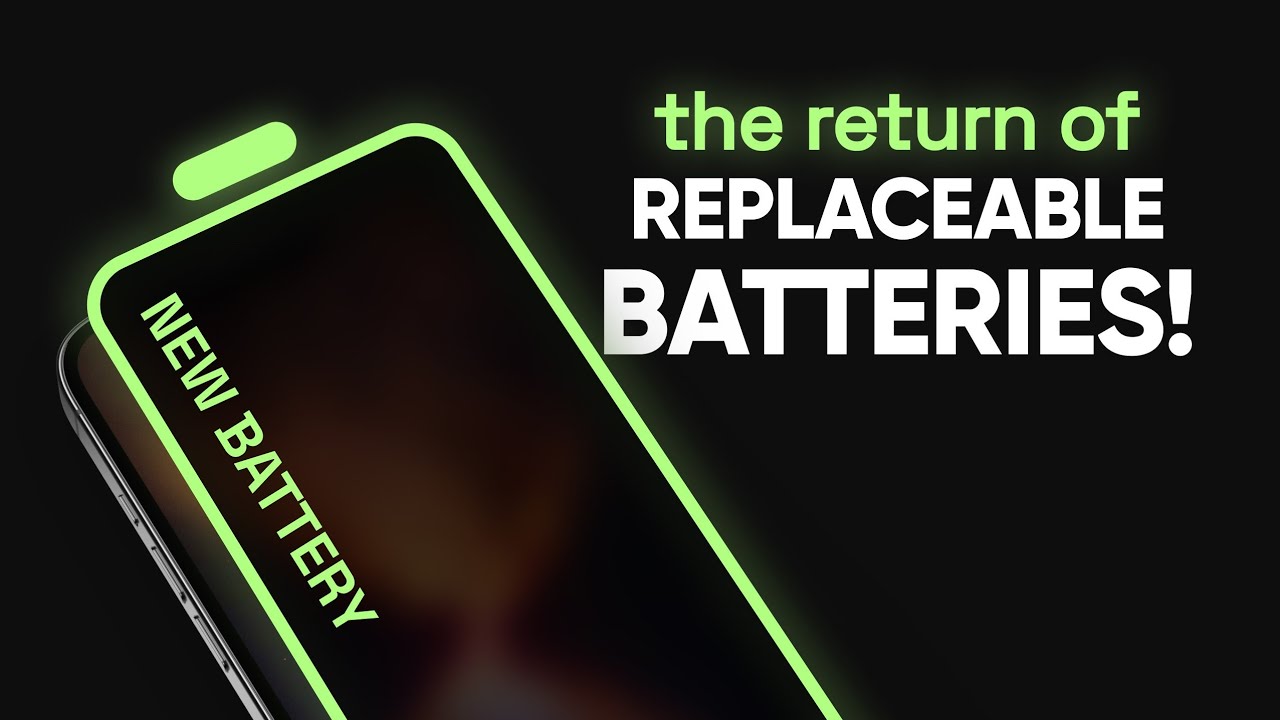Hooray! Younger generations will finally be able to experience the joy of dropping their phone and having to pick up three to four different pieces! /s
(I’m all for this change, by the way)
Oh I remember that with Nokias. It’s like shock absorbing for cars lol.
Honestly, with Apple making it incredibly fucking hard to take out their batteries with excessive amounts of glue, I’m okay with this.
Do they not have the tabs you can pull out anymore?
They do, but they’re incredibly prone to breaking when you pull and sometimes they’re just hard as shit to grip so you have to use a screwdriver to twist and pull.
I don’t think I need to explain why that’s so dangerous.
As someone who has changed hundreds of iphone batteries, the adhesive sucks. At least they changed to a different adhesive around iphone 8 because alcohol does wonders on it. I don’t even attempt to pull the tabs on those anymore.
May I ask how you do that? Do you just…douse the battery in alcohol? There isn’t much of a gap between the adhesive and the battery in my experience, so it just sits inside the chasis and rolls around. I haven’t had any luck with that but I’m probably doing it wrong.
I drizzle some in the corner and then use a sturdy tool to gently pry up on the battery to allow the alcohol to get deeper under. Since the adhesive patches are small to fit around the wireless charging coil, it doesn’t take much. Once you get one side of the battery loose the other will easily come with it, especially if the alcohol got to them.
Fingers crossed that this will be implemented well, im tired of having sleek electronics be irrelevant in 2 years when the silicon could go for 5 or six
The silicon could go on for decades if both the modem and processor were fully documented hardware that the community can access and support in the Linux kernel.
I can run a secure and current form of Linux on 30+ year old hardware if I want to, because the hardware documentation was expected by everyone at the time even if some end users were oblivious to what this meant. The whole reason google pushes Android is because they provide a base Linux kernel that hardware manufacturers can easily slip their proprietary junk into without requiring them to add the kind of open source code needed for mainline kernel support by the community. This is the mechanism that depreciates your device. It is totally artificial and an end user exploitation by design.
It’s usually not silicon on the PCB that fails, but the other electronic components (usually the capacitors) that fails first, and since they are surface mounted devices it’s really difficult to solder them by hand.
There are no electrolytics in phones, and most newer phones don’t even have tantalums. So long as there are no flexing stresses induced, which is nearly impossible with the way phones are constructed now, the all MLC capacitors construction has the potential to outlast any PC motherboard or laptop by a large margin.
The most critical issue is board connectors and moisture ingress. The USB-C connector or any other high pin density micro sized connector with a tiny pin pitch, and large electrical potential will fail from charge cycling and a resistance forming between pins. USB-C is particularly bad because reversing the connector doubles the number of pins on the board in a ridiculous amount of space. Just using a standard USB-C connector when ordering a prototype to be fabed at any common board house will double the price. The USB-C pin pitch is too tight for the most common fab process resolution.
The pin pitch only matters for high power application to prevent arcing, and that can also be resolved through the most modern USB-PD standard (See: USB-PD Extended Power Range, which can support up to 240w), and the electrical adjustment you have to make are all on the device side.
I don’t know about the resistance forming between the pins, for low cycle applications the cheapest gold flash plating would easily last 10K plug cycles, and accounting for corrosion from hand sweat/oil/hand lotion, many companies favor going for thicker hard gold or platinum plating nowadays. (Rhodium is the absolute best, but it’s just too expensive now to do at scale because they are used in catalytic converters for electric cars). USB-C lasts for many more cycles than the Micro-USB standards before it (You can read the 4 axis and wrenching test standards for mechanical testing on the USB spec) so I’m not sure what you are talking about here.
Lab tests rarely reflect the real world. I’ve seen several issues with Pixels that had an issue with PD failing due to moisture, corrosion, and a bridge developing at the connector.
Actually, no, the lab tests are standard with all products of all large companies, and they are usually conducted in extreme conditions, like 100% moisture at 80-90C oven for 48 hours and highly concentrated salt spray kind of extreme.
You bring up the example of Google Pixel, yeah, because it’s Google, they are software people who think they can just cheap out on hardware and save a couple of cents by making it up in software. Look at the Nexus 5X and 6P, both devices had an absurd amount of quality control issues compared to the other products made by the manufacturers, and the only factor in common between them is Google.
Things change with time. The Pixel is now the most secure phone available due to its hardware encryption key verification system. It is the only phone that can run a verifiably secure bootloader and ROM on top of the same untrusted hardware situation found in all modern proprietary devices. Running a Pixel on Graphene OS is the most free and honestly liberating experience that has been available since the invention of capacitive touch technology made these handheld computers popular. The hardware build is on par with any similar device of the same price point, made in the same facilities as most devices.
Do y’all remember the days when you dropped your phone and it exploded into 3 or 4 pieces? 🤣 Those were the good days.
Three. Battery, cover and the rest. Weirdly, no damage to the plastic display. How? I guess it was the
weatherbezelWell, it was plastic. Pretty hard to crack plastic like glass
And when you scratched up the back you bought a new one for $12. No $200 glass or machined aluminum cases that we put $35 covers on just to protect them from every day use.
Phones are getting more expensive so people are holding on to them longer, so it’s a nice quality of life improvement to remove the barriers to battery replacement so less people have to go down to a phone repair store to get it changed. The more of a hassle battery replacement is seen the more likely people are to just upgrade and create e-waste.
The problem here is that in order for most people to be able to replace the battery themselves safely they need to be really idiot proof. We’d need to return to back covers with latches or big screws and batteries in cases and contacts. This shit is bulky, heavy and hardly waterproof.
New iPhones use lipo pouch with a ZIF connector straight to the motherboard with a “pull to release” adhesive strip hidden under a panel with a single use sticky seal and two small screws. There is no black magic in replacing the battery yourself and the solution is small, lightweight and waterproof. However most people wouldn’t even know which way to turn the screws to loosen them and probably wouldn’t be bothered by throwing the phone away and getting the one with a better camera AI and more emojis.
[edit: deleted, echo chamber here. Android good, Apple bad. Moving on and blocking this community, can’t have a reasonable conversation, just like reddit I guess].
The difference is that most of the people isn’t expected to own a mechanical watch, but having a smartphone is pretty much expected. You cannot treat a basic commodity as if it were a luxury item.
[edit: deleted, echo chamber here]
Excellent! Batteries in modern phones are surprisingly definitely removable and replaceable. I’ve done it multiple times. However, the unfriendly barrier to entry is glue and clips that require careful prying with spugers. It’s quite clear manufacturers are happy blocking you getting in; plenty people just buy new phones when the battery gets too old.
Fairphone 3 user here. My main reason to choose this phone a few years ago was because the battery could easily be replaced. Too many phones are perfectly functional but the battery is half dead. Another boon of non-glued batteries : You can carry two (or more) batteries to easily switch when the first one is KO. Meaning no need for portable charger and useless cables in your pocket. Phone at 10% ? Just change it, bam 100% in a second. Easy as that.
I’ll probably not be the target of such regulations because I wouldn’t choose an anti-consumer phone brand anyway, but at least it’s going in the right direction.
This is great.
If this goes through, I think it would be really good news. Battery failure is one of the leading things that force people to replace their smartphones, and having them be replaceable would go a long way towards making smartphones last longer.
I do miss being able to swap out a phone battery and this will certainly be a step in the right direction in terms ewaste and device longevity.
One thing that I wonder about is waterproofing or water resistance. Some phones are basically waterproof in shallow water. How achievable is this with a device with a trivial way to remove the battery?
The Galaxy S5 sport had a battery door and water resistance. They just used gaskets.

People make this argument and barely anyone really uses the waterprooding features of a phone
You know, I really like my Essential Ph-1. It was a lovely little phone. I had the little 360 camera accessory that snapped on magentically and everything. It was so cool! Then, 1.5 seconds, dropped into water from which I grabbed it instantly, and it was done. No warranty coverage for dropping it in water, and zero waterproofing, and toasted phone. So, yes, more of us “use” waterproofing on our phones than you would think. The thing is that it didn’t need to be this way. There were waterproof phones back before everything was glued glass slabs all the time. Galaxy S5 Sport as mentioned by @HubbleST@lemm.ee above (and other “sport” edition phones). We have a lot of hygrophobic coatings and tech we didn’t have in the day of the Galaxy S5 series. We can do better now, if manufacturers are forced to.
And now they just have to force manufacturers to either at least security patch devices for, let’s say 10 years, or force them to open source everything the community needs to continue supporting this device. It never happened to me that the battery died before support ended.
Just had that issue with my Pixel 3a XL. No more security updates. Had to replace it with a Pixel 6a but I liked the 3a XL more. It there was any community support for the 3a XL, I would rather sell my 6a again.
I actually love all these regulations on smartphones (mainly by the EU), like the recent USB-C standard. That one in particular makes it so much easier to share chargers around the house!
USB-type C to become EU’s common charger by end of 2024
I mean… Sure, but we’ve had USB-C as de facto standard for many years now. When was the last time you saw a micro USB phone?
deleted by creator
I might be in the minority here, but I feel this is actually a step back.
In the 5 years I’ve had my phone, there have been two times I’ve ever really needed to pull the battery, and still the hard reset sequence still eventually worked in both cases.
Anyone remember how some phones had issues with the battery door becoming somewhat loose over time, causing any slight bump to turn the phone off? Many have already commented on how they explode into multiple pieces when dropped. Traditionally the battery covers are incredibly flimsy plastic, even on flagship devices (cough Samsung). Waterproofing is a common concern too, however it actually can be done with a removable battery (e.g. Galaxy S5).
What really needed to be addressed here was how cumbersome it is to get into these devices to replace the battery, and how often people are price gouged to replace them. I believe this could have been better written to allow for either a removable battery, or a standardized and affordable built-in battery replacement process.
This is awesome. Thank god for EU legislation that directly benefits me as an American consumer. Now I can microwave lithium ion batteries in peace!
I can’t wait to hear the Apple marketing word for this feature. They’ll add some gimmick like the battery is held in with magnets and say “We call it MagPack and we think you’re going to love it.”
















